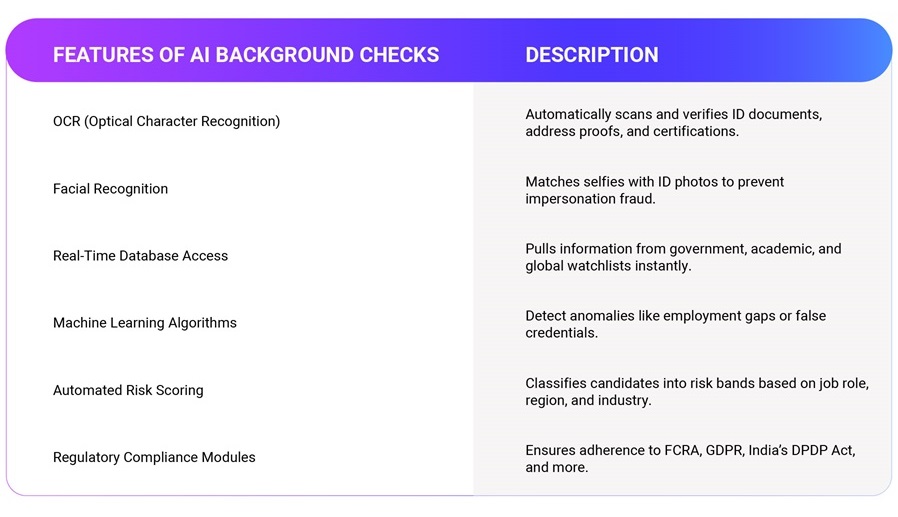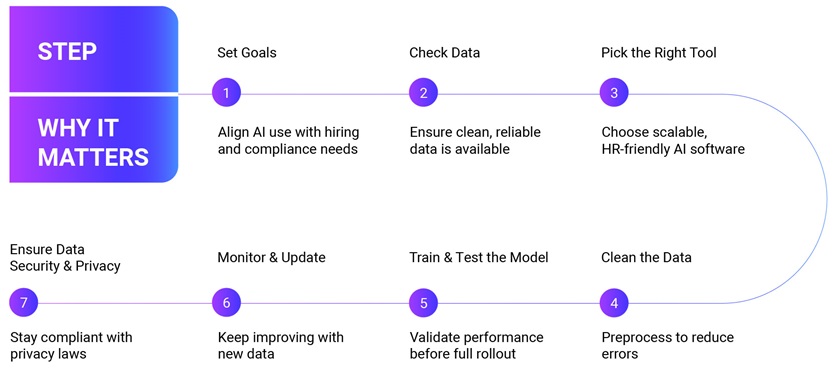You found your ideal candidate.
The interviews were great; the requirements aligned perfectly, and they fit the culture. Now, they are waiting to accept the offer letter.
However, the background check and verification takes two weeks to complete. HR is still chasing education records and prior employment confirmation. The candidate? Gone. They moved on to a competitor who onboarded them in three days.
Now, the entire process to find your ideal candidate has to be repeated. It's not just frustrating; it’s expensive. Especially in companies with hybrid workforces, global hiring, and growing compliance risks, manual background screening is becoming a liability. That’s why organizations are turning to AI in background screening to speed up hiring, improve accuracy, and mitigate compliance exposure.
This blog explains the impact, benefits, and limitations of AI in background screening, compares it to traditional methods, and demonstrates how Exela HR Solutions (EHRS) delivers real-world value by automating, securing, and scaling background checks for global teams.
What is Background Verification and Why It’s Now Business-Critical
Background verification is the process of validating a candidate’s identity, credentials, employment history, criminal records, and more before they join an organization. Traditionally managed manually, this process plays a critical role in mitigating hiring risks, protecting workplace culture, and ensuring regulatory compliance.
However, as workforces become more global, remote, and on-demand, conventional methods are too slow and error-prone to keep up. Organizations face missed hires, legal exposure, and operational delays when screening lags behind.
Enter AI background checks, a game-changer that automates the verification process using advanced technologies like machine learning, natural language processing, and intelligent data matching.
It’s not just about saving time; it’s about making hiring smarter, safer, and scalable.

What Are AI Background Checks?
AI powered background verification checks are digital, automated screening processes powered by artificial intelligence. These systems scan, match, and validate massive volumes of personal and public data in real time, offering HR teams a faster, more accurate, and more compliant approach to screening.
AI ensures that every check, from ID validation to criminal records, is handled consistently and with minimal bias.
Common Features of AI Background Checks
Here’s what modern AI-powered screening typically includes:

Key Technologies Behind AI Driven Background Checks
AI-driven background checks rely on a mix of smart technologies that work together to automate and enhance the screening process. Here’s how each one plays a role:
- Machine Learning (ML): Learns from past data to detect patterns, such as resume fraud or employment gaps, and flags potential risks faster than manual review.
- Natural Language Processing (NLP): Helps read and understand text from resumes, databases, and reports—making sense of unstructured information like job descriptions or reference letters.
- Optical Character Recognition (OCR): Converts scanned ID documents and certificates into readable data for quick validation.
- Facial Recognition: Matches candidate photos with official IDs to prevent impersonation or forged identities.
- API Integrations: Connects with government databases, credit bureaus, court records, and sanction lists to fetch accurate, real-time information.
Together, these technologies help companies speed up hiring without compromising on security or compliance.
AI Driven Screening Benefits and Impacts
The transition to AI powered background verification goes far beyond just accelerating the hiring timeline. It represents a larger shift toward data-driven, standardized, and scalable HR practices. Here’s a closer look at the benefits and how they translate into real-world impact:
1. Shorter Time-to-Hire
Hiring delays can result in the loss of top talent in competitive sectors such as technology, banking, financial services, and healthcare. Because traditional background checks take anywhere between a few days to several weeks due to manual dependencies, third-party delays, or follow-ups.
AI eliminates these inefficiencies by automating data collection, parsing, and validation in real time. It instantly pulls verified information from databases, flags risks using machine learning, and generates ready-to-review reports. This allows recruiters to make faster decisions without sacrificing accuracy.
At EHRS, our AI-powered platform routinely delivers background verification results within 24 to 48 hours, even for high-volume hiring campaigns. This not only reduces time-to-hire by up to 50% but also ensures candidates aren’t lost to competitor offers while waiting on a green light.
2. Consistency and Reduced Human Error
Manual screening is vulnerable to inconsistencies—one HR associate might miss a red flag that another would catch. There’s also the risk of data entry errors, document oversight, or subjective judgment.
AI standardizes the process. With features like optical character recognition (OCR) and pattern recognition, the system analyzes documents and records without bias or fatigue. It scans for tampering, formatting anomalies, and incomplete data, helping ensure every candidate is evaluated with the same level of scrutiny.
This consistency is especially important when screening hundreds—or even thousands—of candidates across different locations or business units.
3. AI in HR Compliance
Background screening is no longer just a best practice; it's a compliance mandate in many industries. However, keeping up with evolving global laws, such as the General Data Protection Regulation (GDPR), India’s Digital Personal Data Protection (DPDP) Act, or the Fair Credit Reporting Act (FCRA) in the U.S., can be overwhelming for HR teams.
AI platforms enable this by embedding compliance logic into the workflow. It manages trigger consent and data storage permissions and generates audit-friendly logs. It can even flag region-specific legal requirements based on the job role or candidate’s location. For instance, a background check for a candidate in the EU will automatically follow GDPR norms, while a U.S.-based hire will be aligned to FCRA-compliant processes without requiring manual oversight.
4. Lower Operational Overhead
Traditional background checks often involve multiple vendors, manual follow-ups, spreadsheets, emails, and administrative friction. This fragmented approach increases operational cost and complexity, particularly during scale-up phases or when managing remote hiring.
AI reduces this burden by centralizing the process into a single, automated flow. Everything from document collection and identity verification to database matching and final reporting is often streamlined through integrations with existing HRMS, ATS, or onboarding platforms.
AI in Recruitment and Background Verification Across Industries
While AI background screening delivers measurable benefits across all sectors, its value becomes especially clear in regulated, high-volume, and risk-sensitive industries.
Each vertical has its own unique hiring complexities, compliance requirements, and verification challenges and AI provides the scalability and precision needed to address them effectively.
Banking, Financial Services, and Insurance (BFSI)
In the BFSI sector, compliance isn't optional; it's ingrained into every hire. With stringent checks around Anti-Money Laundering (AML), Know Your Customer (KYC) norms, RBI/SEBI regulations, and fraud prevention mandates, background verification must be thorough, fast, and fully auditable.AI enables BFSI firms to cross-check candidates against financial blacklists, global watchlists, credit records, and legal databases within minutes. It also ensures that data handling is compliant with financial privacy regulations, such as GLBA and DPDP.
EHRS provides risk-weighted, AI-enabled verification flows tailored to BFSI roles—differentiating between front-office, compliance, and executive hires. Our platform supports high-volume screening during seasonal surges, like tax season or loan processing cycles, without compromising accuracy.
Healthcare and Life Sciences
In healthcare, background verification is about safeguarding patient's trust and lives. Employees often require validation of their medical licenses, malpractice history, drug screening results, and criminal records. Hiring the wrong person can lead to regulatory penalties, reputational damage, or worse, harm to patients.
AI dramatically shortens the credentialing process by automatically scanning and validating medical licenses with boards and councils, checking court databases for malpractice suits, and cross-referencing sanctions and disciplinary actions.
Technology Companies & Remote-First Teams
Tech startups and global SaaS companies move fast, and so must their hiring. However, scaling quickly, especially across borders, creates complexity in screening for fraud, fake credentials, or multi-country compliance. AI helps bridge this gap by delivering automated, self-service background checks integrated directly into hiring platforms, such as ATS or HRMS. Whether the hire is in Bengaluru, Berlin, or Boston, the AI adapts the verification flow to local rules while maintaining central visibility.
How to Implement AI Powered Background Verification: Step-by-Step Guide

Future Trends in AI for Background Checks
Artificial intelligence in background screening is evolving rapidly. Here's what's on the horizon:
- Big Data Integration: AI will tap into larger, more diverse datasets, including those from credit bureaus and public records, enabling deeper and more accurate cross-verification.
- Real-Time Screening: Background checks will transition to live, dynamic updates, providing HR with real-time access to a candidate’s verification status—ideal for urgent or high-risk roles.
- Bias-Resistant Algorithms: Ongoing enhancements will aim to reduce AI bias and increase fairness, aligning with standards such as FCRA and promoting ethical hiring practices.
- Enhanced Risk Profiling: AI will increasingly draw from non-traditional sources, such as vehicle records or financial history, to create more comprehensive risk assessments.
- Mobile and Cloud-Based Platforms: Cloud-native, mobile-first screening platforms will make background verification more accessible, flexible, and user-friendly for both employers and candidates.
Why EHRS is Your AI Background Screening Partner
As hiring speeds up and compliance becomes more complex, AI powered background verification is no longer optional; it’s a strategic necessity. Exela HR Solutions (EHRS) delivers intelligent, AI-driven background screening built for today’s global hiring demands. Our platform combines automation, regulatory expertise, and seamless integration capabilities to provide fast, accurate, and fully compliant verifications up to 40% faster across 180+ countries.
Ready to make background checks smarter?
Explore EHRS Background Verification Solutions now.
